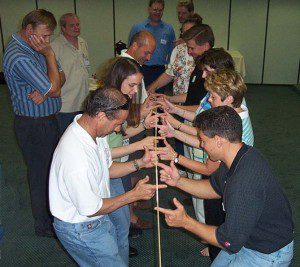 There are plenty of games that teach and reinforce violence, but there’s also a growing number of games for peace. Here are just a few… Which other ones do you have experience with?
There are plenty of games that teach and reinforce violence, but there’s also a growing number of games for peace. Here are just a few… Which other ones do you have experience with?
Who says that violence is cooler and more fun than peace? Sure, with all the violence glorified in movies, TV shows, and video games, by toy guns and action hero dolls it’s easy to see how violence has been made more attractive and why it’s the “easy” alternative to use in case of conflict. But there is actually a growing body of games and activities for peace, whether they are a fun alternative to violent games or whether they teach concrete peacebuilding skills.
One game that has gotten a lot of visibility lately is the World Peace Game that John Hunter designed to play with his 4th grade students. See his TED talk below.
 But if you don’t have time to re-create Hunter’s 3-dimensional game board, check out Fundacio Catalunya Voluntaria’s Peace Bag. The online toolkit offers over 30 modules of games that teach peace. They vary from ice-breakers, creative and physical exercises to simulations. Take for example “Do We Have Alternatives?”, a simulation that focuses on bullying. In the first part of the exercise, participants play out different scenarios that portray various aspects of bullying. This role-play not only demonstrates a range of bullying behaviors, but also helps identify points of intervention. Then the game changes gears as participants discuss “real-life” scenarios and debate some common ideas about bullying and peace. Just like when young children play “house” or “doctor-patient”, this kind of game helps participants “pre-hearse” scenarios that they may well come up against in real life, whether as a perpetrator, victim or by-stander.
But if you don’t have time to re-create Hunter’s 3-dimensional game board, check out Fundacio Catalunya Voluntaria’s Peace Bag. The online toolkit offers over 30 modules of games that teach peace. They vary from ice-breakers, creative and physical exercises to simulations. Take for example “Do We Have Alternatives?”, a simulation that focuses on bullying. In the first part of the exercise, participants play out different scenarios that portray various aspects of bullying. This role-play not only demonstrates a range of bullying behaviors, but also helps identify points of intervention. Then the game changes gears as participants discuss “real-life” scenarios and debate some common ideas about bullying and peace. Just like when young children play “house” or “doctor-patient”, this kind of game helps participants “pre-hearse” scenarios that they may well come up against in real life, whether as a perpetrator, victim or by-stander.
In fact, games and simulations can be such powerful learning tools that the scholarly journal “Simulation & Gaming” dedicated an issue (published in Feb. 2013) to simulation, games and peace. The peer-reviewed articles discuss everything from how these types of games might influence policy to how to design peace games. While reading through these academic articles might not be everyone’s idea of fun, knowing that the topic is being researched certainly gives credence to the fact that peace can come through games and that games can teach peace.
If you can’t find what you’re looking for in the Peace Bag, they’ve been nice enough to provide links to additional materials, including the Council of Europe’s Young People Building Europe page which provides links to 4 additional websites with modules on games for peace. You may also find what your look for on Wilderdom’s peace education experiential activities page or their general games page.

